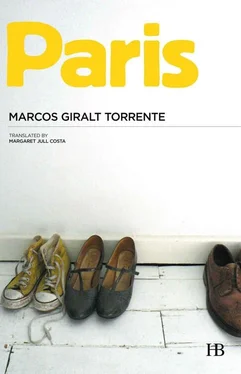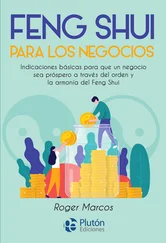Marcos Giralt Torrente - Paris
Здесь есть возможность читать онлайн «Marcos Giralt Torrente - Paris» весь текст электронной книги совершенно бесплатно (целиком полную версию без сокращений). В некоторых случаях можно слушать аудио, скачать через торрент в формате fb2 и присутствует краткое содержание. Год выпуска: 2014, ISBN: 2014, Издательство: Hispabooks, Жанр: Современная проза, на английском языке. Описание произведения, (предисловие) а так же отзывы посетителей доступны на портале библиотеки ЛибКат.
- Название:Paris
- Автор:
- Издательство:Hispabooks
- Жанр:
- Год:2014
- ISBN:9788494228452
- Рейтинг книги:5 / 5. Голосов: 1
-
Избранное:Добавить в избранное
- Отзывы:
-
Ваша оценка:
- 100
- 1
- 2
- 3
- 4
- 5
Paris: краткое содержание, описание и аннотация
Предлагаем к чтению аннотацию, описание, краткое содержание или предисловие (зависит от того, что написал сам автор книги «Paris»). Если вы не нашли необходимую информацию о книге — напишите в комментариях, мы постараемся отыскать её.
Paris — читать онлайн бесплатно полную книгу (весь текст) целиком
Ниже представлен текст книги, разбитый по страницам. Система сохранения места последней прочитанной страницы, позволяет с удобством читать онлайн бесплатно книгу «Paris», без необходимости каждый раз заново искать на чём Вы остановились. Поставьте закладку, и сможете в любой момент перейти на страницу, на которой закончили чтение.
Интервал:
Закладка:
“Delfina doesn’t understand. She worries about us too much and doesn’t realize there are certain decisions that have to be made, even if they might prove prejudicial to us. We’re all the family she has. I’m not saying she’s not happy, she might well be. But she’s too much alone. We represent the future for her. That’s why she wants to protect us, and her desire to protect blinds her to other things.”
I don’t know what she means, but that doesn’t matter, because I know it’s purely incidental, coincidental, and I look away and see the little red light that tells me the record player is still on although it’s no longer playing. “She’s never had children herself,” I repeat inwardly while my mother again pauses and takes a pull on her cigarette, gestures betrayed by the tip glowing more brightly in the darkness and by the bracelets that rattle their way up and down her arm.
“But you’re not like Delfina. You’re like me, and you know that this is a better way to do things. He paid half the cost of the apartment — well, his parents did — and it wouldn’t be right to deny him what is his. It would be ignoble. After all, now that he no longer lives with us. .”
My mother stops talking, as if she regretted what she’d said, or regretted not weighing her words more carefully. She doesn’t hesitate exactly, it’s merely a slight vacillation, just long enough for her to realize that to remain silent would be worse. She takes advantage of that pause to knock the ash off her cigarette and into the ashtray balanced on the arm of her chair. Despite the encroaching darkness, I can still see her pale, freckled face, from which all trace of a smile has gone. I think briefly about my father and tell myself that, this time, the void left by his unspoken name was more obvious, because, in her desire not to say it, she has had to replace it with a pronoun. She says, “He no longer lives with us and never will again, let’s be quite clear about that.”
She spoke quickly, as if speed would diminish the effort of saying something she finds difficult to say, and as if her difficulty might then pass unnoticed by me. That final phrase, although spoken more for her own benefit than for mine, sounded forced, unnatural. She hasn’t said anything I don’t already know, but hearing it put so bluntly troubles me, and I peer timidly into her eyes, two dark hollows barely visible in the steadily thickening mist covering them. The little light coming in through the window is in her favor, and noticing my look, she hurriedly adds, “I’m not saying anything you don’t know, anything you haven’t already guessed, I imagine.”
She spoke as quickly as before, but I noticed the tension in her words, the door left open to the possible error represented by that fragile, hesitant “I imagine.” I sense her overwhelming need as a mother for me to respond, and I nod affirmatively. She doesn’t sigh or smile, but conceals her relief by taking another deep pull on what little remains of her cigarette. She stubs it out with more tinkling of bracelets, then uncrosses her legs and leans forward to replace the ashtray on the table. Only after exhaling the last puff of smoke, as if she had regained her strength, does she say, “We’ve never spoken about it before, but we both know that’s how it is. We know each other so well that sometimes we forget to speak. It’s as if when we think something, we assume that the other must have thought it, too. ‘I’m there in your eyes and you’re there in mine,’ you said to me once when you were very small. You won’t remember. You were only about three. But I remember, because it sums up our relationship so very well. We live so closely, so dependent one on the other, without siblings or cousins, that we forget to speak. We’re like an old married couple. .”
My mother intends this as a joke. She’s more relaxed now and is smiling again as she was at the beginning, but I can’t do the same, I can’t show her that I, too, have relaxed, because I can’t stop thinking about what she said about cousins. She said “without siblings or cousins” without specifying whose, but it’s obvious she meant mine. She has unconsciously brought my attention to the fact that I have no siblings or cousins. I have cousins on my father’s side, but I never see them or have anything to do with them, and so it’s as if I had no cousins. I don’t have grandparents, either, and my only real aunt is Delfina, but she didn’t mention that. There’s something about her remark that shocks me, and even though it’s perfectly true, it still troubles me to hear her say it, as if she had gotten inside my head or as if my mind were an open book. I don’t know if she realizes this, but she carries on almost without stopping, “It’s good that we should be so close, but it can be awkward at times and lead to misunderstandings and false impressions, because we don’t talk enough, or because we assume that the other person already knows what we think because we’ve already thought it.”
I’m listening intently despite my blushes, despite the darkness that’s gradually filling the room but that my mother, so sunk in her own thoughts, appears not to notice. Nevertheless, I feel quite calm, and my thoughts emerge from somewhere deep inside, as if I were not the person sitting across from her but someone else watching and listening to myself; there’s what my mother says, what the person with her is thinking, and then what I’m thinking. I know we haven’t yet gotten beyond the preliminaries and that it will take a while to get to wherever it is she’s heading, but my second me, the one accompanying her and whom I only see and hear in the distance, is not quite so calm and feels somewhat tense and irritated by my mother’s slow way of speaking, by her feigned seriousness, by the absence of the name she still hasn’t mentioned and yet is the one name that cries out to be spoken.
“I know it’s my fault. I haven’t deliberately kept silent, I just didn’t notice that all the while time was passing, and so the two come to the same, in the end.”
My mother, who raised her voice slightly as she spoke those final words, falls suddenly silent, reaches forward as if to get another cigarette, thinks better of it, and withdraws, glancing around her, as if she’s only just noticed how dark the room is and is thinking that perhaps she should turn on a lamp; then she looks at me and says, “It can hardly be news to you. You knew he would never come back to live with us, even though we haven’t actually spoken about it. You knew as well as I did. .”
I see how difficult she is finding it to continue, and I understand, too, just how extreme that last statement is from the speed with which she corrects herself, “All right, not as well as me, the difference being that you were under no obligation to speak, whereas I was.”
She’s finding it hard to go on, I feel the care with which she weighs each word, and even though the darkness covering her face has thickened, I see her struggle and frown.
“I didn’t want to think about it. I wanted to unconsciously delay something that brooked no delay, but meanwhile, time has passed and made the decision, because sometimes it’s time that decides, not us.”
She has gotten into her stride now, and the words emerge from her mouth fluently, but for a few moments, I stop listening and wonder what it was that brooked no delay. Her words are ambiguous. I can’t understand her, just as I can no longer see her face, which is almost completely obscured now, just a pale, evanescent smudge against the earth-brown backdrop of the armchair and the mauve light of the window. What was it that brooked no delay — talking about it, or not wanting to think about it? It’s true that we both knew, but why exactly does he no longer live with us, I ask myself. The fact that we both know doesn’t explain anything, and only makes the need for an answer more urgent.
Читать дальшеИнтервал:
Закладка:
Похожие книги на «Paris»
Представляем Вашему вниманию похожие книги на «Paris» списком для выбора. Мы отобрали схожую по названию и смыслу литературу в надежде предоставить читателям больше вариантов отыскать новые, интересные, ещё непрочитанные произведения.
Обсуждение, отзывы о книге «Paris» и просто собственные мнения читателей. Оставьте ваши комментарии, напишите, что Вы думаете о произведении, его смысле или главных героях. Укажите что конкретно понравилось, а что нет, и почему Вы так считаете.












